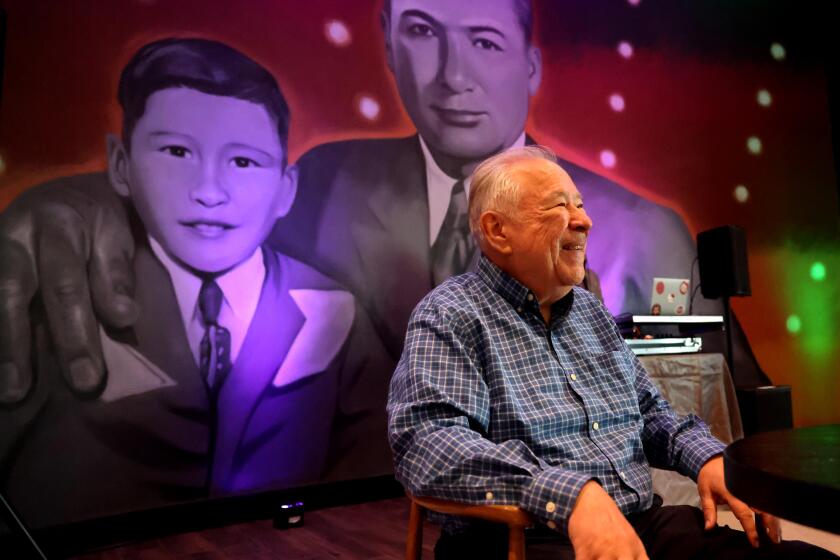Taking the suburbs by ‘Storm’
Ang Lee’s reputation as one of the most versatile directors working is richly deserved, though it might also be a little misleading. The Taiwanese-born New Yorker shuttles effortlessly among eras, cultures and genres, moving from the domestic (“Eat Drink Man Woman”) to the epic (“Ride With the Devil”), from martial-arts acrobatics (“Crouching Tiger, Hidden Dragon”) to superhero angst (“Hulk”), from class-conscious Regency England (“Sense and Sensibility”) to the mythologized Wild West (“Brokeback Mountain”).
But there are common threads that unite these seemingly disparate works. Running through most of Lee’s films, all of them produced and many of them written or co-written by James Schamus (now the head of Focus Features), is a tension between the desires of the individual and the dictates of society.
Time and again Lee has returned to the distorting force of sexual repression, most famously in “Brokeback Mountain” but also in such films as his early culture-clash comedy “The Wedding Banquet,” and last year’s “Lust, Caution.”
“The Ice Storm” (1997), a central film in Lee’s body of work, examines the flip side of that theme: the destructive potential not of repression but of a particular brand of permissiveness. Before this elegant portrait of the suburban bourgeoisie in the wake of the sexual revolution, out in a two-disc edition from the Criterion Collection this week, Lee was known in the States as a maker of art-house exotica. His earlier films had been set in Taiwan or among Chinese Americans, the one exception being the Emma Thompson-scripted Jane Austen adaptation “Sense and Sensibility.”
But “The Ice Storm,” which traces the entwined fates of two families, is nothing if not all-American -- an attempt to distill the embarrassment and disenchantment of the Nixon years as felt by the affluent residents of a Connecticut commuter town. The source novel, by Rick Moody, was itself a WASP-lit update, adding a disaffected-teen perspective to the templates created by John Updike and John Cheever.
Set during Thanksgiving week 1973, the film remains a potent evocation of a watershed period in American social and political history. Lee didn’t experience it first-hand -- he arrived in the U.S. to attend the University of Illinois in 1978 -- but he did abundant research before the shoot (watching Paul Mazursky movies and ‘70s sitcoms, digesting the era’s pop psychology and feminist literature). As the actors attest in the Criterion set’s accompanying featurette, they received binders stuffed with period-specific reference points.
There are no weak links in the ensemble. Among the older generation, Kevin Kline modulates between comic disorientation and raw despair, and Joan Allen is both bitter and brittle in her patented role of the stoic wronged woman (she also imparts an additional subtext, having indelibly portrayed Pat Nixon in Oliver Stone’s 1995 “Nixon”). Their younger counterparts are equally adept at projecting a wounded bafflement, especially Christina Ricci and Adam Hann-Byrd as precocious sexual experimenters.
The technical work is also superb across the board. Several of the DVD’s extras are devoted to the look of the film: the controlled palette of Frederick Elmes’ cinematography and the careful mimicry of Mark Friedberg’s production design and Carol Oditz’s costumes.
Like Moody’s novel, Lee’s film stumbles when it reaches for the cosmic: Greek tragedy by way of a freak accident. The problem with the tear-jerking, deeply symbolic climax, in which a child is sacrificed for the sins of the parents, is not so much that it clashes with the movie’s coolly satirical tone but that it can’t help seeming puritanical.
Until that point, though, “The Ice Storm” is a persuasive dissection of the countercultural mind set as it devolved from youthful idealism to a set of commodified lifestyle choices. If the movie transcends its last-minute lunge into cautionary moralism, it’s thanks to Lee’s empathetic treatment of his characters and his nuanced handling of an eternal subject: the conflict between tradition and rebellion.
More to Read
Only good movies
Get the Indie Focus newsletter, Mark Olsen's weekly guide to the world of cinema.
You may occasionally receive promotional content from the Los Angeles Times.










